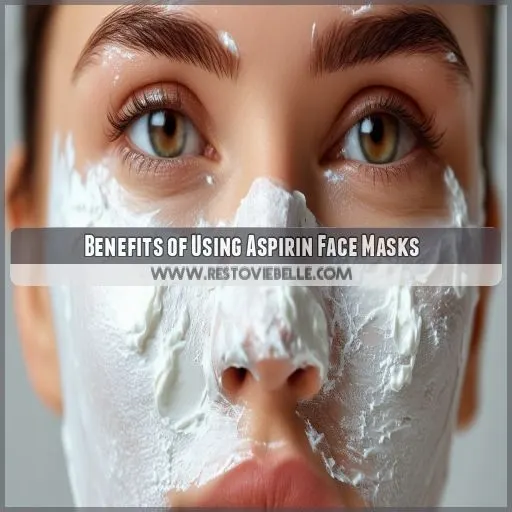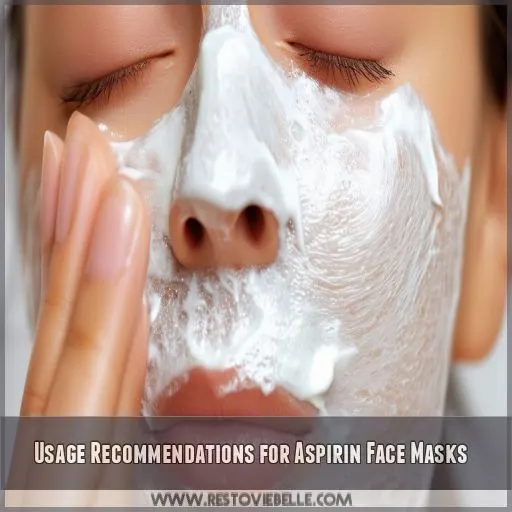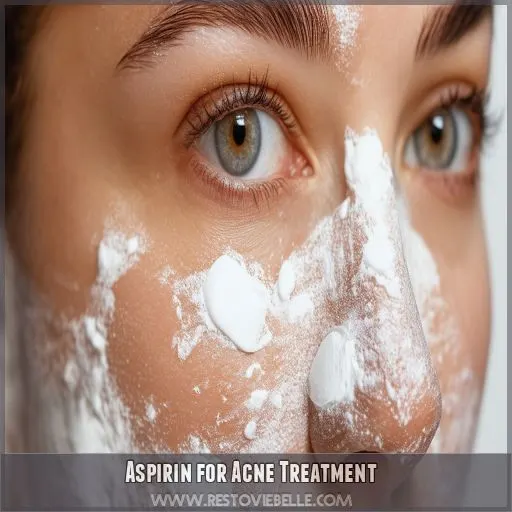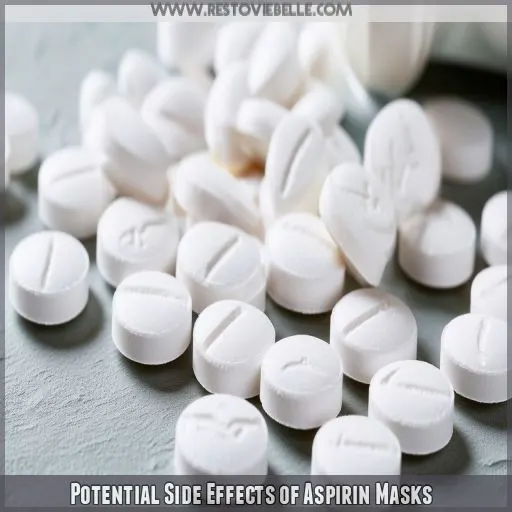This site is supported by our readers. We may earn a commission, at no cost to you, if you purchase through links.

Unleash the power of aspirin face masks and transform your skin.
Discover the benefits: exfoliation and acne treatment.
Explore easy-to-follow recipes to create your own mask.
Remember to always patch test and consult a doctor if concerned.
Let’s embark on a journey towards clearer, brighter skin.
Table Of Contents
- Key Takeaways
- What Are Aspirin Face Masks?
- Benefits of Using Aspirin Face Masks
- How to Make an Aspirin Face Mask?
- Mixing Aspirin With Different Ingredients
- Usage Recommendations for Aspirin Face Masks
- Aspirin for Acne Treatment
- Potential Side Effects of Aspirin Masks
- Frequently Asked Questions (FAQs)
- Does aspirin face mask really work?
- Is aspirin good for your face?
- How to make a face mask with aspirin?
- How often should I use an aspirin face mask?
- Whats the ideal consistency for an aspirin face mask?
- How often can I use an aspirin face mask?
- Are there any side effects to using aspirin face masks?
- Can I use aspirin face masks if I have sensitive skin?
- How long should I leave the aspirin face mask on for?
- Conclusion
Key Takeaways
- Aspirin face masks are like superheroes for your skin, fighting off acne and dullness with their exfoliating and brightening powers.
- Don’t be a stranger to the patch test; it’s your skin’s safety net, ensuring the mask won’t cause any adverse reactions.
- If you have sensitive skin, tread carefully with aspirin masks. They might be a bit too potent for your skin type.
- Remember, even the best things should be enjoyed in moderation. Overusing aspirin masks can lead to dry, flaky skin that craves moisture and comfort.
What Are Aspirin Face Masks?
Aspirin face masks are a type of DIY skincare treatment that can be made at home. They typically contain a small quantity of crushed aspirin tablets and a liquid base, such as water or apple cider vinegar. The masks are designed to be applied to the face, left on for a short period, and then rinsed off.
The key active ingredient in aspirin face masks is salicylic acid, which has anti-inflammatory and exfoliating properties. This makes aspirin face masks particularly beneficial for those with acne-prone or inflamed skin.
When creating an aspirin face mask, it’s important to use uncoated aspirin tablets and adjust the quantity and batch size according to your skin type and needs. You can also experiment with different water alternatives, such as apple cider vinegar, and add-ins like honey or tea tree oil for enhanced effects.
Benefits of Using Aspirin Face Masks
Aspirin face masks can exfoliate your skin and clear blemishes thanks to the salicylic acid-like ingredient in aspirin. These masks can also brighten and soften your complexion, while providing relief for acne and redness.
Exfoliation and Blemish Clearing
Aspirin face masks can enhance your skincare routine by offering exfoliation and blemish-clearing benefits. Here’s how:
- Exfoliation: The star ingredient, acetylsalicylic acid (ASA), is a salicylic acid substitute. This beta-hydroxy acid (BHA) helps shed dead skin cells, unclogs pores, and smooths the skin’s texture, resulting in a brighter and more even complexion.
- Blemish Clearing: The anti-inflammatory properties of ASA reduce redness and swelling associated with acne, and its antibacterial action helps combat the bacteria that contribute to breakouts.
Skin Brightening and Softening
Aspirin face masks can help brighten and soften your skin. The salicylic acid in aspirin acts as a gentle exfoliator, clearing away dead skin cells and revealing brighter, softer skin underneath. Plus, aspirin’s anti-inflammatory properties can help reduce any redness or inflammation, giving your complexion a more even tone.
For an extra boost of moisturization, you can add honey to your aspirin face mask. Honey is a natural humectant, which means it helps lock in moisture, keeping your skin soft and supple. Honey also has antibacterial properties, which can help keep your skin clear and blemish-free.
Acne Treatment and Redness Relief
Aspirin face masks are a great way to combat acne and reduce redness, thanks to the power of salicylic acid. Here’s how it works:
- Salicylic Acid Penetration: The active ingredient in aspirin is similar to salicylic acid, a common acne-fighting ingredient in skincare products. It penetrates deep into your pores, breaking down the substances that clog them, reducing acne formation.
- Inflammation Reduction: Aspirin’s anti-inflammatory properties soothe redness and reduce swelling, giving your skin an even tone.
- Anti-Bacterial Properties: The mask’s antibacterial action prevents acne-causing bacteria’s growth, promoting clear, healthy skin.
- Skin Irritation Prevention: Regular use can fade acne scars and prevent breakouts, giving you clearer, more confident skin.
How to Make an Aspirin Face Mask?
To make an aspirin face mask, follow these simple steps:
- Crush 3-4 uncoated aspirin tablets into a fine powder.
- Mix the aspirin powder with 1/2 teaspoon of water if you have oily skin, or 1/2 teaspoon of oil if you have normal to dry skin. You can also use olive oil for its exfoliating properties.
- Optionally, add a small amount of honey to the mixture for its exfoliating, hydrating, and antibacterial benefits.
- Adjust the consistency of the paste with additional liquid if needed.
- Always do a patch test on a small area of your skin to check for any allergies or reactions before applying the mask to your entire face.
Mixing Aspirin With Different Ingredients
You can enhance your aspirin face mask by mixing it with honey and yogurt for added moisture and soothing effects. Alternatively, apple cider vinegar can be used to minimize pores, and additional ingredients like tea tree oil can further boost the mask’s benefits.
Honey and Yogurt for Added Benefits
Honey and yogurt are optional additions to your aspirin face mask, offering enhanced benefits for your skin.
Honey has natural antibacterial and skin-soothing properties, helping to heal and reduce redness and inflammation.
Yogurt possesses anti-inflammatory qualities, further calming the skin, and its natural probiotics may promote skin health.
Together, these ingredients, combined with aspirin’s antiseptic properties, create a powerful tool against acne and blemishes.
The mask is easy to prepare, effective, and affordable, making it convenient for achieving clear and bright skin.
Apple Cider Vinegar as an Alternative
While honey and yogurt are great additions to the aspirin face mask, apple cider vinegar is another alternative ingredient that can be used instead of water.
Apple cider vinegar (ACV) contains acetic acid, which has been shown in clinical studies to possess antibacterial properties and reduce inflammation.
The efficacy of ACV in improving skin health has been proven, making it a popular choice for those seeking clear and brightened skin.
Optional Add-Ins for Enhanced Effects
You can enhance the benefits of an aspirin face mask by incorporating additional natural ingredients.
Tea tree oil is an effective moisturizer for dry skin.
Egg whites possess anti-aging qualities and can improve skin firmness.
Honey is nature’s healer, while lemon offers relief from sunburn.
To minimize the appearance of pores, include vinegar in your mixture.
These supplementary ingredients amplify the overall effectiveness of the aspirin mask, delivering a more comprehensive skincare treatment.
Usage Recommendations for Aspirin Face Masks
Before using an aspirin face mask, test it on a small area of your skin to check for any allergic reactions or irritation. Apply the mask once or twice a week, but avoid it if your skin is already irritated or broken.
Frequency and Testing on Small Area
Regarding frequency, using an aspirin face mask once or twice a week is a good guideline. Remember, moderation is key, and you should avoid over-exfoliating your skin, which could lead to dryness and irritation.
Here are some key precautions and testing tips:
- Always do a patch test on a small area of skin first, such as the inside of your arm or behind your ear, to make sure you don’t have any adverse reactions.
- If you have sensitive skin, consider doing a patch test each time you use the mask, as your skin’s tolerance may vary.
- Pay attention to how your skin feels after using the mask. If you experience excessive dryness, flaking, or irritation, reduce the frequency of use or consult a dermatologist.
- If you have active pimples or acne blemishes, be cautious when testing the mask. Avoid applying it directly to inflamed areas, as it may irritate them further.
Caution for Allergic Reactions and Irritated Skin
While aspirin face masks can be beneficial, it’s essential to exercise caution if you have sensitive skin or are prone to allergic reactions. Always perform a patch test on a small area of skin before applying the mask to your entire face. This simple precaution can help you avoid potential irritation or allergic responses.
If you experience any skin sensitivity, such as redness, itching, or inflammation, discontinue use immediately and consult a dermatologist. Remember, everyone’s skin is unique, and what works for others may not be suitable for you.
For those with irritated skin or allergies, there are alternative treatments available that can provide similar benefits without the risk of adverse reactions. Consider consulting a dermatologist or skin care specialist to explore suitable alternatives that align with your skin’s needs and sensitivities.
Aspirin for Acne Treatment
Aspirin’s salicylic acid-like properties make it an effective acne treatment. You can use aspirin masks overnight or as a spot treatment to help clear blemishes and reduce the appearance of acne scars.
Mechanism and Efficacy
Aspirin contains a salicylic acid-like ingredient, which is a common active component in over-the-counter topical acne treatments. This acid helps to exfoliate the skin, clearing pores and reducing the appearance of acne. While aspirin may provide some benefits for inflammatory acne, it’s worth noting that it isn’t as potent as dedicated acne treatments containing benzoyl peroxide or prescription-strength topical treatments.
Use for Acne Scars and Overnight Treatment
The aspirin mask can be a powerful tool for addressing acne scars and providing overnight spot treatment. Here’s how it works:
- Acne Scars: The salicylic acid-like ingredient in aspirin helps to gently exfoliate the skin, promoting cell turnover and fading acne scars over time. It’s like giving your skin a fresh start!
- Overnight Spot Treatment: When applied as a targeted treatment before bed, the aspirin mask can reduce inflammation and soothe redness, helping to calm angry blemishes while you sleep. Wake up to clearer skin!
However, it’s important to remember that the aspirin mask isn’t a magic bullet for acne scars or overnight treatment. While it can be effective, results may vary, and it’s essential to manage your expectations. Here are some key considerations:
- Always perform a patch test before using the mask, especially if you have sensitive skin.
- Be cautious and avoid using the mask on irritated or broken skin.
- Consult a dermatologist if you have any concerns or questions about using an aspirin mask for your specific skin concerns.
Potential Side Effects of Aspirin Masks
Before using an aspirin mask, be aware of potential side effects like allergic reactions or skin irritation, especially if you have sensitive skin. If you experience any adverse effects, discontinue use immediately and consider other home remedies for skin care.
Interactions and Allergic Reactions
While aspirin face masks can be beneficial, it’s essential to be aware of potential interactions and side effects. Here’s a concise overview:
| Consideration | Details |
|---|---|
| Aspirin Allergy | Some individuals may experience an allergic reaction to aspirin. If you’re allergic to aspirin or salicylic acid, avoid using aspirin masks. |
| Pregnancy & Breastfeeding | Due to potential risks, pregnant and breastfeeding women should refrain from using aspirin masks. Consult your healthcare provider for specific advice. |
| Medical Conditions | Certain medical conditions may warrant avoiding aspirin. If you have a condition requiring aspirin avoidance, opt for alternative treatments. |
| Skin Sensitivity | Always perform a patch test before applying an aspirin mask. This is essential, as some may experience sensitivity or irritation from the salicylic acid in aspirin. |
| Other Ingredients | When customizing your mask with add-ins, make sure you’re not allergic to any additional ingredients. |
Alternative Home Remedies as Caution
While aspirin face masks can be an affordable and accessible home remedy, it’s essential to proceed with caution. Here’s why:
Skin Sensitivity and Preparation Safety:
- Always perform a patch test on a small area of skin before applying any new product or remedy. This is especially important for those with sensitive skin.
- Avoid using aspirin masks if you have any skin irritation, inflammation, cuts, or sunburns.
- Discontinue use if you experience any adverse reactions, such as redness, itching, or burning.
Ingredient Precautions and Home Treatment Risks:
- Be mindful of potential allergies to aspirin or other ingredients in the mask, such as vinegar, raw honey, egg whites, or olive oil.
- Don’t use aspirin masks if you’re pregnant, breastfeeding, or have any medical conditions that require aspirin avoidance.
- Be cautious of anecdotal evidence and unverified claims about the benefits of aspirin masks. Always seek reliable sources and expert advice.
Here are some alternative home remedies worth considering:
- Vinegar: Apple cider vinegar is often touted for its skin benefits, including its ability to minimize pores and balance the skin’s pH levels.
- Raw Honey: Honey has natural antibacterial and anti-inflammatory properties, making it ideal for treating acne and soothing irritated skin.
- Egg Whites: Rich in protein and amino acids, egg whites can provide a tightening effect on the skin, making them a popular choice for anti-aging treatments.
Frequently Asked Questions (FAQs)
Does aspirin face mask really work?
Yes, aspirin face masks can work to exfoliate and cleanse your skin. The active ingredient in aspirin is a form of salicylic acid, a powerful exfoliant. But be cautious: it can also strip moisture from your skin.
Is aspirin good for your face?
Aspirin contains acetylsalicylic acid, which is similar to salicylic acid, found in many over-the-counter acne medicines. It may help reduce inflammatory lesions and redness. However, it can increase skin sensitivity to UV rays, so be sure to wear sunscreen.
How to make a face mask with aspirin?
First, crush 3-4 uncoated aspirin tablets. For oily skin, mix with 1/2 teaspoon of water. For normal to dry skin, use 1/2 teaspoon of oil. Add honey to the mixture. Adjust the consistency with liquid if needed.
How often should I use an aspirin face mask?
You should use an aspirin face mask once or twice a week, depending on your skin type and the severity of your skin issues. Some sources suggest using it 2-3 times a week, and others say you can use it up to 5 times a week if you have problem areas.
Whats the ideal consistency for an aspirin face mask?
The consistency of your aspirin face mask should be like cold cream, so it’s spreadable but not too runny. Adjust with a little liquid if it’s too thick.
How often can I use an aspirin face mask?
You can use an aspirin face mask a few times a week for optimum results. However, be careful not to use it too often as it may dry out your skin.
Are there any side effects to using aspirin face masks?
When using aspirin face masks, there are a few side effects to be mindful of.
The most common is skin dryness.
This can lead to more frequent breakouts if your skin’s natural oils are stripped away.
Other possible side effects may include:
- Irritation
- Peeling
- Redness
Be cautious to avoid getting aspirin in your eyes, as the dust particles can be irritating.
Can I use aspirin face masks if I have sensitive skin?
If you have sensitive skin, it’s best to consult a doctor before using an aspirin face mask. While it’s unlikely to be harmful, some people are allergic to aspirin, even when applied topically.
How long should I leave the aspirin face mask on for?
You should leave the aspirin face mask on for 10 to 15 minutes. Some sources suggest that you can leave it on for as little as 2 to 3 minutes, but no longer than 15 minutes.
Conclusion
Aspirin face masks are a simple, at-home solution to tackle acne, dullness, and redness. The anti-inflammatory properties of aspirin provide exfoliating and skin-brightening benefits, helping to achieve clearer skin. When creating your own mask, be cautious and always perform a patch test. While aspirin masks can be effective, they may not work for everyone, and allergic reactions are possible. Remember to consult a doctor if you have any concerns.













